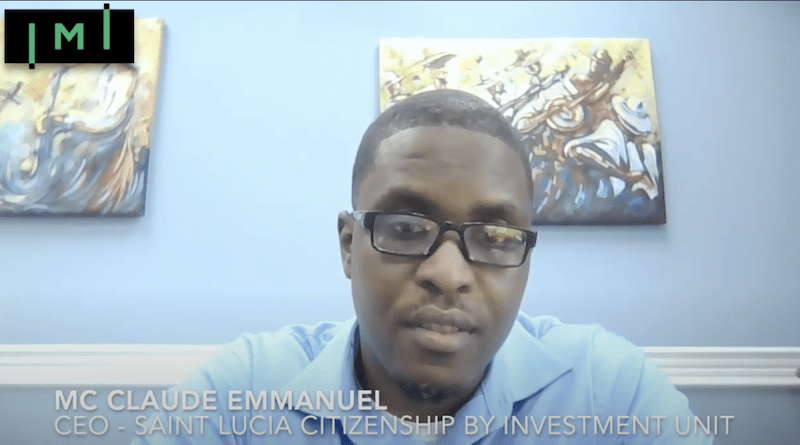“We Didn’t Have Much of a Choice”: St. Lucia CIU Boss on Suspension of Russian CIP Applicants
In an interview with IMI, the Saint Lucia Citizenship by Investment Unit’s chief executive, Mr. Mc Claude Emmanuel, indicates that while he understands the need for solidarity with the international community, he is by no means content with having to turn away Russians of good character and indicates the Caribbean is lobbying against such blanket bans. Moreover, he points out, Caribbean CBI jurisdictions can only begin to accept Russians again once the region’s banks feel comfortable with them.
“Internally, we feel the Russia-Ukraine situation,” says Emmanuel. “As a territory, it featured in our top-five [sources of applicants] during the 2021-22 fiscal year.”
At the same time, he says, other source markets have improved to more than offset the absence of Russian investment, highlighting growing demand from North America and from what he refers to as “bedrock” markets in China and the Middle East.
Questioned as to why Saint Lucia had decided to suspend Russians in the first place, as well as the degree to which the five Caribbean CBI jurisdictions – all of which suspended Russian and Belarusian applicants within the space of two weeks in March (see: Full House: St. Lucia Becomes 5th Caribbean CIP to Suspend Russians, Belarusians) – had acted in concert, Emmanuel indicates the Caribbean reaction to the invasion had been quick but not necessarily coordinated.
“I wouldn’t say there was much collaboration prior to the suspension. There was a rapid response to the invasion, and it was somewhat of a unilateral move […] We didn’t have much of a choice,” he adds, hinting that the decision had been informed by external pressures.
Caribbean CBI countries urging a more nuanced approach
Since the early days of the conflict, however, the region’s CBI stakeholders have, to some extent, banded together to argue against the exclusion of Russians on the basis of their nationality alone.
“As individual territories in the Caribbean, we are small in size. However, we felt that by joining forces and having a single voice, we’d have a more resounding effect in lobbying against that sort of action,” he explains. “So, we have since written, as a community, and we’ve been meeting our third-party stakeholders, our marketing agents, our various lobbies, and our friendly allies abroad, [and enlisted them] to help plead our case. Internally, we’ve had discussions with the US State Department, with the UK High Commission, to explain to them the extent of our due diligence process.”
He emphasizes that many productive, skilled Russians who have lived outside of their home country for decades are now adversely affected by the actions of the Russian government and have now become personae non gratae through no fault of their own.
“We, fundamentally, have no issue accepting Russians.”
While he says he believes Russians will once more be welcome among most Caribbean CIPs once the conflict is “resolved”, Emmanuel points out that the chief obstacle to this happening is not to be found among Caribbean CIPs themselves but, rather, with the banks to which CBI application fees and investment funds are sent.
“Definitely, our banking partners are critical to this process,” Emmanuel remarks. “And, obviously, they have their correspondent banking relationships, and we can only begin to accept [Russians] – even post this ongoing invasion – when our banks are again comfortable with them. […] If our banks are unwilling or unable to accept funds from Russian sources and those persons cannot pay the requisite fees and can’t make their investments, then the business of due diligence cannot happen. So, I think, this is probably the most fundamental part of the process; it’s the banking sector’s responsibility.”
IMI Club Members’ Exclusive Content
While you can watch a Russia-focused excerpt of the interview in the video above, IMI Club and IMI Club PRO members can watch the full 27-minute interview by visiting the Exclusive Interviews section in the IMI Club Members’ Lounge.
In the full-length interview, Emmanuel goes into further detail about
- The contents of the discussions they are having with the EU, US, and the UK around the suspension of Russian and Belarusian applicants, as well as about the integrity of CBI programs and the retention of visa-free access to Schengen;
- Why Saint Lucia’s CIP is once again accepting Iranians and the changes that needed to take place for that to happen;
- How the program has performed in terms of application volume in the most recent fiscal year, as well as which countries have been the greatest sources of applicants;
- An update on the program’s real estate option (“One of the projects is relatively dormant”), the degree to which projects are on schedule and how the CIU works to encourage progress, and what plans are on the drawing board for new CBI real estate approvals; and
- His plans for a “revamping of the policy framework” for the program


